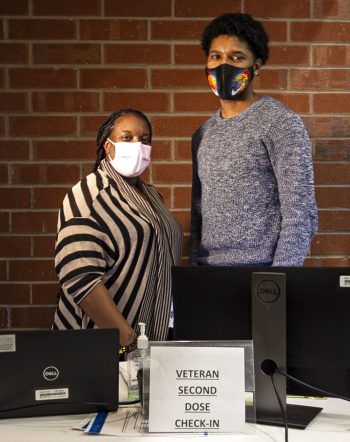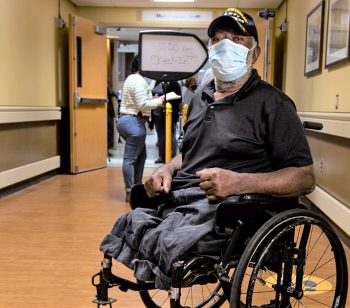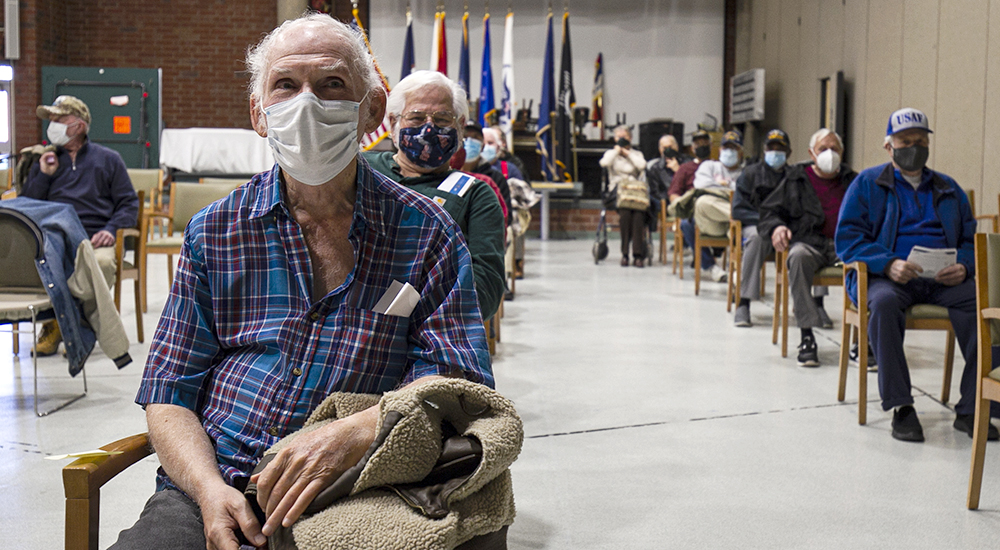A year into the pandemic, much has been said about the heroes of health care. The front-line nurses, doctors, first responders, ICU staff who have saved countless lives and are now helping steer the largest vaccination initiative in world history. Their efforts have been universally lauded, and rightly so.

Tiffany Felder, left, and Daryl Warren, are critical to successful operations of the vaccine clinic. Felder is an advanced Medical Support Assistant and Warren is an MSA and current acting secretary for the chief of Health Administration Services here.
They are not alone. Behind the scenes, a few steps back from the “front line,” are the support staff who enable care delivery for Veterans enrolled with the 4,000-employee strong Central Virginia VA Health Care System.
Medical Support Assistants, the army of facilitators who work to connect Veterans with providers, serve many roles: Customer service, appointment scheduling, records management, jack-of-all-trades. If it involves customer relations and connecting Veterans with care, MSAs can do it.
Pictured above in the front chair, Air Force Veteran Lee Jones waits, seated in the Vaccine Clinic observation area. Jones, Vietnam War Veteran, served from 1957 through 1968. Veterans receiving the vaccine must wait at least 15 minutes before departing the clinic to ensure they have no adverse reactions.
As of February 23, nurses in the clinic had provided more than 16,000 doses of the vaccine for Veterans, employees, volunteers and caregivers.
MSAs, the backbone of the facility
The COVID-19 vaccine rollout is exhaustive and much of the workload falls on MSAs, according to Daryl D. Warren, MSA, acting secretary for the chief of Health Administration Services.
“Being able to work alongside the nursing staff allows both the MSAs and nursing staff to provide world-class service to the Veterans,” he said. “MSAs are the backbone of the facility and their roles are forever important.”
Everything has changed since the virus began to sweep across the globe. What hasn’t changed is the Central Virginia Health Care System team’s commitment to the roughly 68,000 Veterans who receive care at one of CVHCS’s six sites of care across Central Virginia.
“Every day I wake up knowing that I am going to make a change in someone’s life as an MSA,” said Warren. “I may look at some days as a rough day but serving Veterans has allowed me to understand that I am providing service to those who provided service for me.
Act as ambassadors for each Veteran

Vietnam Army Veteran Chris Bacon at the vaccine clinic. Bacon served from 1967 to 1968 and then worked for the IRS for 22 years.
“Working for hours during the current pandemic has allowed me to have a gratifying feeling at the end of the day knowing that I worked to my best capabilities,” Warren continued. “This experience has truly enhanced my compassion for the field as well as my work ethic.”
MSAs tie the Veterans’ experience with the hospital to the physical – or virtual – encounter the Veteran has with a provider. They act as a critical link and as ambassadors for each Veteran who seeks care at CVHCS.
Though their duties and responsibilities are myriad, their primary role is to ensure each Veteran receives the world-class care they earned while in uniform, according to Tiffany Felder, MSA, Health Benefits Department’s Centralized Registration section.
“I understand that during these times it can be very stressful for some of them. And I’m honored to work with the Veterans during this time to provide world-class service,” she said. “I look at all my Veterans as family. I make sure they receive the care and information they deserve.”
Ensuring eligible Veterans are enrolled is especially important today as Veterans currently enrolled with the Veterans Health Administration are scheduled for the COVID-19 vaccine.
Tim Parish is a public affairs officer for the Central Virginia VA Health Care System. Photos by Megan Kon, a public affairs specialist for the Richmond VA Medical Center.
Topics in this story
More Stories
The Medical Foster Home program offers Veterans an alternative to nursing homes.
Watch the Under Secretary for Health and a panel of experts discuss VA Health Connect tele-emergency care.
The 2024 National Veteran Suicide Prevention Annual Report provides the foundation for VA’s suicide prevention programs and initiatives.







Ours are awesome and need to be paid better so we can keep them!
Pay them better!!!
Please dont speak for all the AMSA/MSAs, when only viewing them behind an off-colored lens of your specific area. Speaking for my own area; we feel our VA and its vets to be a family. If this is your situation, if you are a vet, then there are several avenues to report your distaste and get help. If your are a VA worker, then you need to contact the AMSA/MSA’s lead and discuss the attitudes you witnessed.
Not in Maine. Up here it’s “did you try to check in on the kiosk?”. All they want to do is hide behind a wall and NOT do their jobs. Quit lying.